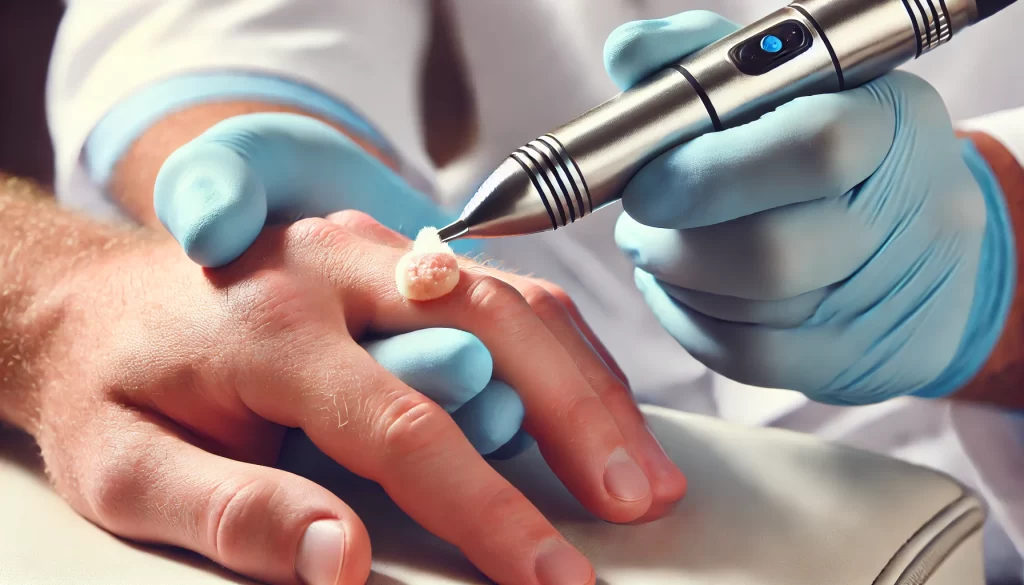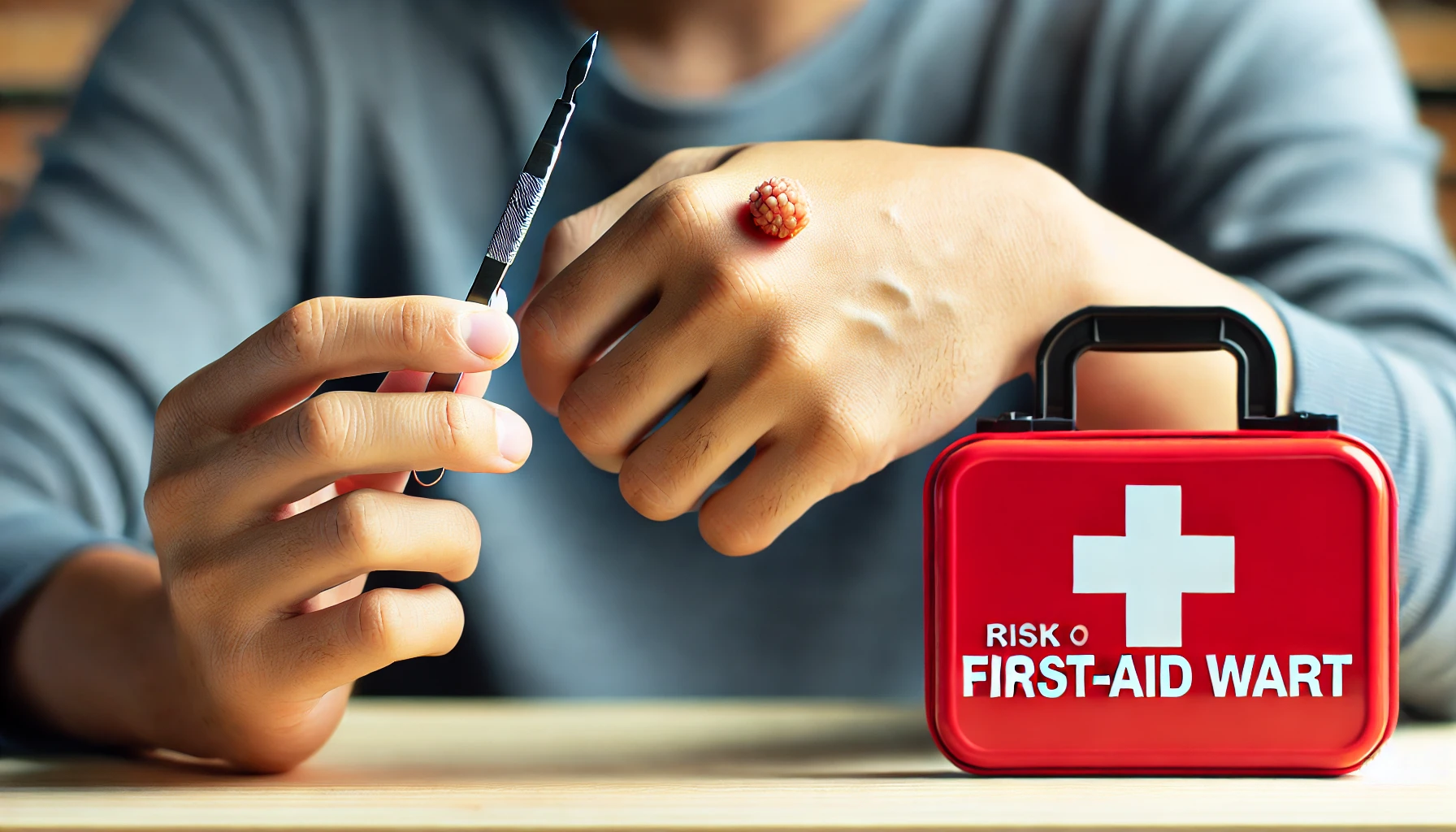Table of Contents
Warts can be annoying, unsightly, and uncomfortable. Unsurprisingly, many people are eager to get rid of them quickly. But the big question remains: Can you cut a wart off yourself? While it might seem like a quick solution, you need to know some shocking truths before attempting to remove a wart on your own. This article dive deep into the risks, alternatives, and expert advice on cutting warts.
What Are Warts?

Warts are rough, tiny skin growths caused by the HPV virus, commonly found on the hands, feet, and other parts of the body. While they are typically harmless, they can be unsightly or uncomfortable, prompting people to wonder, “Can you cut a wart off?” before seeking removal methods.
Can You Cut a Wart Off?
Cutting off a wart may seem like a straightforward solution. But can you cut a wart off safely? The truth is that cutting a wart off yourself can lead to many risks, including infection, bleeding, and even spreading the virus to other parts of your body.
Why Cutting Warts Yourself Is Risky

Risk of Infection
One of the biggest concerns with cutting off a wart is the risk of infection. Warts are caused by a virus, and cutting into your skin could introduce bacteria. This may lead to excruciating infections that need medical attention. An infection could lead to further complications even if the wart is removed.
Bleeding and Scarring
Warts often have deep roots, and cutting into them can cause excessive bleeding. Not only can this be messy, but it may also lead to scarring. Instead of simply removing the wart, you might end up with a permanent mark that’s even more noticeable than the wart itself.
The Virus Could Spread
If you cut a wart off yourself, you risk spreading the HPV virus to other parts of your skin. This means that instead of removing the wart, you could accidentally cause more to appear elsewhere. The virus could also spread to other people if not handled carefully.
Safer Alternatives to Cutting a Wart Off
While cutting a wart off yourself might seem tempting, there are safer and more effective ways to remove warts. Before asking, “Can you cut a wart off?” consider exploring some of the best alternative methods available for wart removal.
Over-the-Counter Treatments
Many over-the-counter (OTC) treatments are available for wart removal. These products often contain salicylic acid, which softens and gradually removes the wart. These treatments can take time but are generally safer than cutting the wart off yourself.
Freezing (Cryotherapy)
Cryotherapy is a popular method for wart removal. It involves freezing the wart using liquid nitrogen, which causes it to fall off after a few days. While this method is often done in a doctor’s office, OTC versions are available for home use.
Duct Tape Method
One surprising method some people swear by is the duct tape method. This involves covering the wart with duct tape for several days, then soaking and filing the wart to remove the dead skin. Although the evidence on its effectiveness is mixed, it’s a low-risk option to try before cutting a wart off yourself.
See a Dermatologist
If you’re unsure about the best way to remove a wart, it’s always a good idea to consult a dermatologist. A doctor can safely and effectively remove a wart using cryotherapy, laser treatment, or minor surgery. This eliminates the wart without causing further issues, such as infection or scarring.
What Happens If You Cut a Wart Off?
If you’ve already cut a wart off or are still considering it, here’s what you need to know about the potential aftermath. Before asking, “Can you cut a wart off?” it’s essential to understand the risks involved.
Immediate Effects
After cutting a wart, you may experience immediate bleeding, pain, or swelling. The wart may also not be completely removed, which means it could regrow in the same spot.
Long-Term Complications
In the long run, cutting a wart off yourself could result in scarring or spreading the virus. These long-term issues may be more complex to treat and could require medical intervention.
Also Read: When Can You Spay a Dog? Protect Their Health Now!
Can Warts Disappear on Their Own?
Believe it or not, many warts go away on their own. The body’s immune system can sometimes fight off the HPV virus, causing the wart to shrink and disappear over time. This process can take months or even years, but it’s a natural way to eliminate warts without any risks.
When to Seek Medical Help
If your wart is painful, growing, or bleeding, seeking medical attention is important. If the wart has been around for a long time and shows no signs of going away, you should also consult a doctor. A dermatologist can recommend the best course of action for removal.
So, can you cut a wart off yourself? While it’s technically possible, the risks far outweigh the benefits. Cutting a wart off could lead to infections, bleeding, scarring, and even the spread of the virus. Instead of taking matters into your own hands, consider safer options like OTC treatments, cryotherapy, or consulting a dermatologist.
Ultimately, the best approach to wart removal is one that keeps your skin healthy and minimizes the risk of complications. By exploring safer alternatives and avoiding risky DIY methods, you’ll be better equipped to deal with warts effectively and safely.

